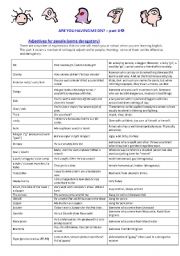
|
BRITISH TERMS & SLANGS - ADJECTIVES FOR PEOPLE
There are a number of expressions that no-one will teach you at school when you are learning English. This part 4 covers a number of colloquial adjectives for people. WARNING:some of them can be offensive and derogatory.
Level: intermediate
Age: 14-17
Type: reading
Downloads: 185
|
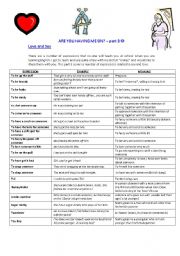
|
LOVE AND SEX EXPRESSIONS - BRITISH ENGLISH
There are a number of expressions that no-one will teach you at school when you are learning English. This part 3 covers a number of expressions and slangs related to sex and love. Very useful if you are keen to learn a little bit more about the British culture
Level: intermediate
Age: 14-17
Type: reading
Downloads: 203
|
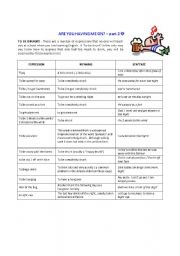
|
TO BE DRUNK AND ALCOHOL RELATED EXPRESSIONS - BRITISH ENGLISH
There are a number of expressions that no-one will teach you at school when you are learning English. If �to be drunk� is the only way you know how to express that one had too much to drink, you will be surprised by these expressions used very often by the British! Great if you want to share with your learners a bit more of the British culture! En...
Level: intermediate
Age: 14-17
Type: Choose
Downloads: 41
|
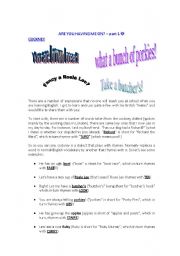
|
COCKNEY! BRITISH VOCABULARY AND MOST USED EXPRESSIONS
There are a number of expressions that no-one will teach you when you are learning English at school. I got to learn and use quite a few of them with my British �mates� and would like to share them with you. This first text is about COCKNEY ENGLISH and the most common well-known expressions from the "rhyming dialect". ENJOY!!!
Level: intermediate
Age: 10-17
Type: reading
Downloads: 59
|
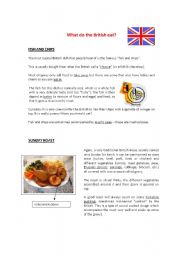
|
WHAT DO THE BRITISH EAT? TYPICAL EXPRESSIONS AND MEALS
This is a reading activity and one that covers some of the most typical British dishes, describing how they are eaten (such as chips with vinegar!) and the nicknames some of the ingredients have. A good vocabulary knowledge for those who are keen to learn a bit more of the British culture! :)
Level: elementary
Age: 9-17
Type: reading
Downloads: 90
|
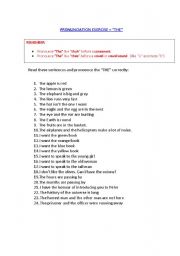
|
HOW TO PRONOUNCE "THE" CORRECTLY
This worksheet helps the learners to pronounce correctly the word "THE" when it comes before a consonant or a vowel. The correct sound of "THE" is very important to a fluent speech.
Brief lesson followed by exercises and answer sheet.
Level: intermediate
Age: 7-17
Type: worksheet
Downloads: 13
|
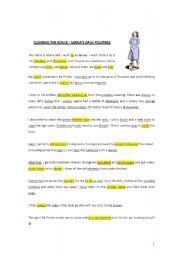
|
CLEANING YOUR HOUSE � PART 2 (COMPREHENSION TEXT AND EXERCISES)
This worksheet is ideal to work with after you learned the vocabulary given on my other worksheet called �Cleaning your House�.
It has a reading section including some of the key vocabulary learned as well as a comprehension exercise. It also has some great tips for the teacher on page 3 plus the answers for the comprehension exercise on page 4...
Level: elementary
Age: 6-17
Type: worksheet
Downloads: 6
|
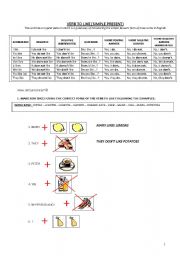
|
VERB TO LIKE - BASIC EXPLANATION AND PLENTY OF EXERCISES
THE VERB "TO LIKE" HAS A REGULAR PATTERN AND IT IS A GOOD WAY OF INTRODUCING THE SIMPLE PRESENT FORM OF MOST VERBS IN ENGLISH.THE WORKSHEET HAS A BASIC EXPLANATION OF THE VERB CONSTRUCTION IN THE AFFIRMATIVE, NEGATIVE, INTERROGATIVE FORMS AS WELL AS THE "SHORT ANSWERS" FORM, FOLLOWED BY PLENTY OF EXERCISES. ANSWER SHEET FOR THE EXERCISES INCLUDED O...
Level: elementary
Age: 6-17
Type: worksheet
Downloads: 15
|
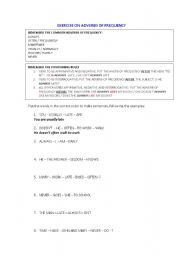
|
ADVERBS OF FREQUENCY - BASIC POSITIONING RULES AND EXERCISES
THIS WORKSHEET HAS A SHORT SUMMARY OF THE MOST COMMON ADVERBS OF FREQUENCY AND HOW TO POSITION THEM IN A SENTENCE, FOLLOWED BY SIMPLE EXERCISES TO HELP THE LEARNERS TO CONSOLIDATE THE SUBJECT.
Level: intermediate
Age: 7-17
Type: worksheet
Downloads: 11
|
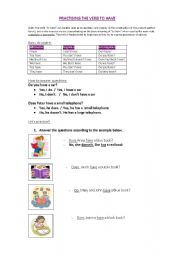
|
VERB TO HAVE - PLENTY OF PRACTICE FOR BEGINNERS!
After the verb "to be", the verb "to have" is the one of the most important verbs for beginners as they can express ownership of things. This worksheet has 6 pages of exercises with a basic lesson at the beginning, followed by question, affirmative and negative practice of the verb "to have" in the present tense. It counts on some basic vocabulary ...
Level: elementary
Age: 5-17
Type: worksheet
Downloads: 9
|